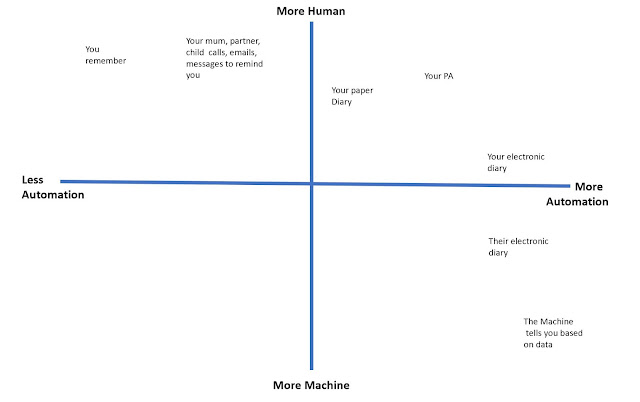Algorithms vs Processes. Subtle but important differences about bias and people in the loop
Algorithms vs Processes. In both an input is transformed to an output – there is a difference in HOW.
Algorithm = a set of mathematical instructions or rules that, especially when coded enable a computer to calculate an answer. Typically, specific instructions that can be followed or learnt, that can be mechanised and reduces human involvement to zero. It is a tool it is driven with an idea about better or the most efficient resource allocation. An algorithm is a WHAT and HOW
Process = a series or method of tasks/ steps/ actions that are taken in order to achieve a result. Typically, instructions that can be followed or learnt, that enable human and compute/ machine involvement to achieve a set goal, objective or result. A procedure is the prescribed way of undertaking a process. A process is a therefore a WHAT and a procedure is HOW
Why important, we debate a lot about the dependence on algorithms in the computer age and how these algorithms will talk over the world and put everyone out of work.
I was reading this on Algocratic Governance from A Aneesh at Stanford. Love this thought in his work “Programming technologies have gained ability to structure possible forms of behavior without much need for orienting people toward accepting the rules. Under the algocratic mode of governance, work is controlled not by telling the worker to perform a task, nor necessarily by punishing the worker for their failure, but by shaping an environment in which there are no alternatives to performing the work as prescribed” His 2006 book is here
Currently if algorithms and processes stopped working then everything will stop. We know we have automated a lot and improved performance/ efficiency, which means that you can read this on your mobile. No automation, no car, no mobile and no content. However, the purpose here is to explore a thought. What is the best way to remember an anniversary, and is one way better than another?

Why does it matter?
The most efficient is combining WHAT and HOW (algorithm), which is why the questions need to be asked as we don’t have visibility or an understand of the WHY it is doing what it does. We know that algorithms are optimised for efficiency (profitability/ contribution) however what we cannot see, or measure is the social impact. If we continue on the same path (which is an assumption) where algorithms deliver convenience, profit and efficiency (and controlled by others with no governance) – we can see the dystopian outcomes where the human is left out of the loop. The goal of the algorithm is to help us fit some of our preference but that does not mean all of them all the time.
Perhaps we should rethink some of the models we have that drive us to (selfish) automation - one being Maslow’s Hierarchy of needs. In a new model we have to serve others by necessity to earn to pay for basics, but as we move up in terms of wealth and perhaps automation should we aim better for ourselves and others that we can choose service to others (either in what we automate on in what we do) Given we will all have bias, and therefore the data has bias and the algorithm has bias, does those bias’s become less problematic when the focus is on better service to society ?

I do worry that Facebook’s new #Libra model for trust and identity (wrapped up in a blockchain crypto currency) means that those who can least afford to pay for privacy, but need identify, are forced into a model that only serves the few.